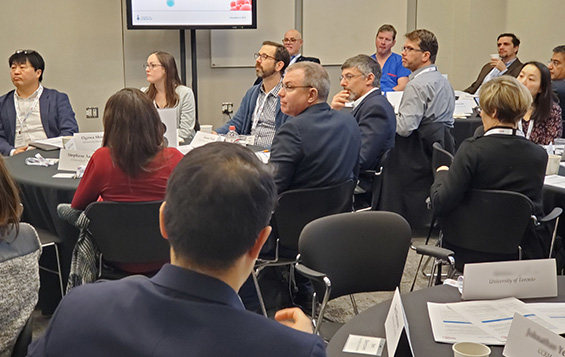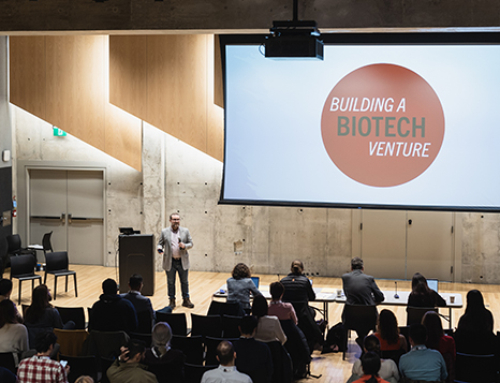
Photo from a workshop at a past Medicine by Design symposium. (Photo by Neil Ta.)
The next phase of Medicine by Design will focus on areas such as enabling faster and better recovery from disease, biomanufacturing to drive the affordability and accessibility of therapies and engaging diverse communities in the clinical implementation of therapies.
To help define these future research directions, Convergent Working Groups — a new funding opportunity that Medicine by Design will invest up to $1-million into — aims to bring wide-ranging expertise and perspectives together.
Participants’ expertise will span disciplines (the physical and life sciences, medicine, engineering, and social sciences) across the academic, private and not-for-profit sectors.
“It is imperative that, in addition to interdisciplinary researchers, these Convergent Working Groups will also incorporate others such as industry partners, regional accelerators and the voices of the patients and communities we aim to serve and engage,” says Michael Sefton, scientific director of Medicine by Design. “As we work to develop therapies, it’s important that we take an integrated approach that considers all aspects: the underlying research and the process of commercializing it and making it available to patients who need it the most.”
Convergent Working Groups will kick-off Medicine by Design’s new strategic vision
The Convergent Working Groups mark the start of implementing Medicine by Design’s new strategic plan, which advances Medicine by Design’s mission to harness Toronto’s extraordinary expertise across convergent disciplines and institutions to invent, develop, scale and implement regenerative medicine therapies that will transform healthcare for Canada and the world.
The strategic plan outlines commitments that Medicine by Design is making as it works toward the vision of strengthening Toronto as a globally leading ecosystem for regenerative medicine innovation. These commitments will serve as theme areas for the Convergent Working Groups.
Sefton adds that the Convergent Working Groups will include individuals from across the Toronto Academic Health Sciences Network (TAHSN), which includes U of T and its hospitals, but will also welcome new people from industry, government and the not-for-profit sector to provide input on how research questions can be tackled and what resources are needed.
Investigators are encouraged to apply in a two-phase, competitive process
The Convergent Working Groups aim to integrate experts who are new to the regenerative medicine community with those who have been involved with Medicine by Design in the past. Each group will be led by an investigator who is affiliated with U of T.
Sefton says that groups are expected to integrate the principles of equity, diversity and inclusion (EDI) and also have people from a mix of career stages, including Early Career Researchers.
After applying for Phase 1, successful groups will receive funding to convene a workshop with the expected outcome of a white paper with a call-to action. In Phase 2, the working groups will be eligible for a further $200,000 in funding to address a specific research question identified by the working group.
Phase 1 proposals for the Convergent Working Groups are due by September 30, and those that are accepted will hold their workshop in late 2022 or early 2023.
Learn more about the Convergent Working Groups.
About Medicine by Design
Medicine by Design builds on decades of made-in-Canada excellence in regenerative medicine dating back to the discovery of stem cells in the early 1960s by Toronto researchers James Till and Dr. Ernest McCulloch. Regenerative medicine uses stem cells to replace diseased tissues and organs, creating therapies in which cells are the biological product. It can also mean triggering stem cells that are already present in the human body to repair damaged tissues or to modulate immune responses. Increasingly, regenerative medicine researchers are using a stem cell lens to identify critical interactions or defects that prepare the ground for disease, paving the way for new approaches to preventing disease before it starts. Medicine by Design is made possible thanks in part to a $114-million grant from the Canada First Research Excellence Fund.


